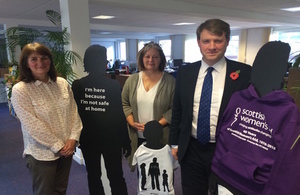Minister champions a democracy that works for everyone in Scotland
Today Chris Skidmore met Scottish Women’s Aid in Edinburgh to discuss making anonymous voter registration more accessible to survivors of domestic abuse.

In September, the minister announced that he would examine the requirements for citizens to register to vote anonymously. Anonymous registration is already available to people whose safety would be at risk if their name and address appeared on the electoral register, but it requires court documents or the signature of a “qualifying officer” such as a senior police officer in order to register anonymously.
Many survivors of domestic abuse don’t meet these stringent requirements and are essentially locked out of the democratic process. The number of women being sheltered in Scotland differs day to day but Scottish Women’s Aid calculated that on a single day in 2015 there were 347 women living in their refuges.
Last month the minister hosted a roundtable with domestic abuse charities and electoral organisations to discuss how the process could be improved. Today, he heard from Scottish Women’s Aid about how they feel current legislation, in many circumstances, is preventing vulnerable people from registering to vote and participating in our democracy. In a recent speech, the minister set out his vision for electoral reform and how his focus is on making British politics open to everyone.
The minister also visited Glasgow where he hosted a roundtable with groups representing Black, Asian and Minority Ethnic (BAME) communities in Scotland to understand how democracy can work to draw everyone together. In Edinburgh he met with Shelter, the charity that supports homeless people across England and Scotland; and with Joe FitzPatrick, the Minister for Parliamentary Business for the Scottish Government.
Chris Skidmore, Minister for the Constitution, said:
I want our democracy to work for everyone - wherever they are, whatever their circumstances, whatever their background. Everyone should have an equal opportunity to have their say and when they do speak, their voices should have the same value.
I want to thank everyone I met today who gave me valuable insight into the challenges some people face when trying to make their voices heard.
Dr Marsha Scott, CEO of Scotland Women’s Aid, said:
We know that the system for anonymous voter registration is not working for women – last year in Lothians fewer than 10 women applied. If women experiencing domestic abuse are to be allowed to participate in democracy then a different approach is required, one where local Women’s Aid groups can support women in their applications rather than requiring police or social work involvement.
We are grateful to the minister for meeting with us and recognising our concerns and for his commitment to a democracy where people of all genders and situations are given the opportunity to participate. We look forward to seeing concrete action to make it so.